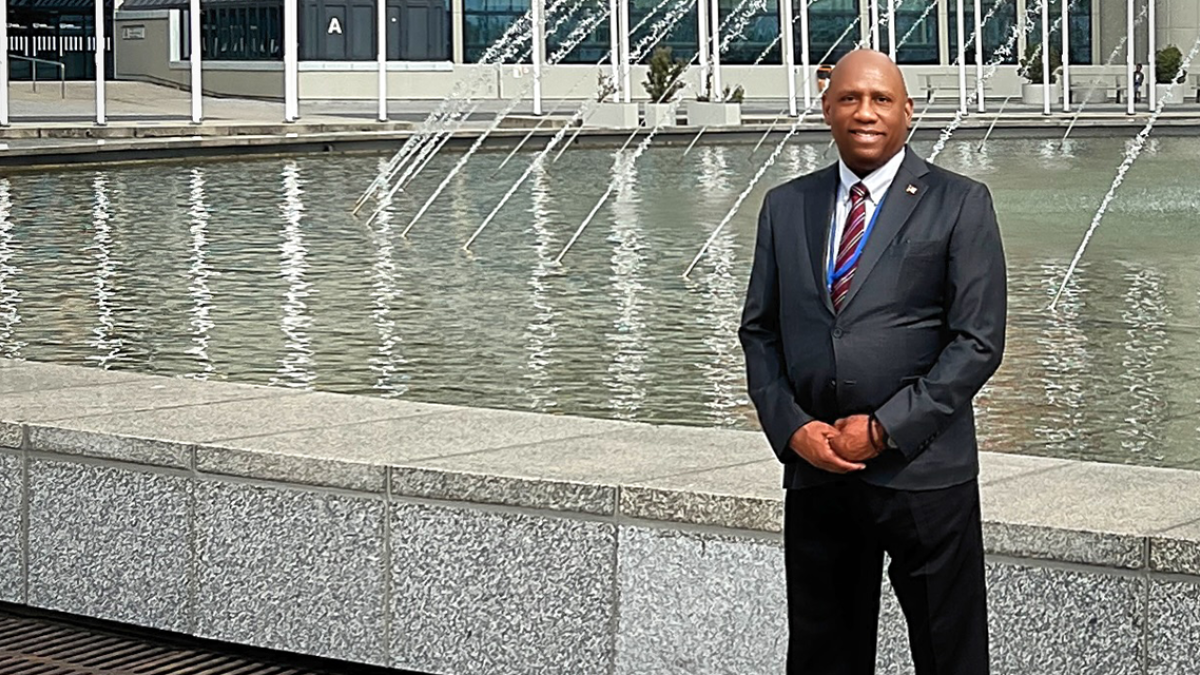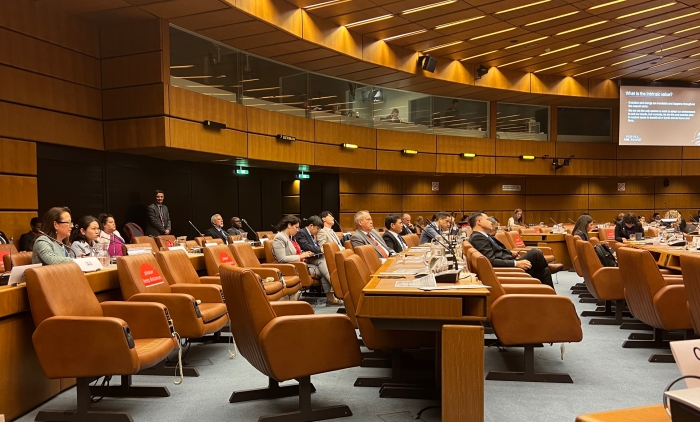Thunderbird alum leads proposal for UN Sustainable Development Goal on space

Karlton D. Johnson, retired Air Force colonel and a graduate of the inaugural Executive Master of Global Management: Space Leadership, Business, and Policy cohort at the Thunderbird School of Global Management at Arizona State University, recently spoke at a joint panel discussion at the U.N. Headquarters in New York City to advocate for the consideration of a historic 18th sustainable development goal on space. Courtesy photo
In 2015, the United Nations adopted a set of 17 goals aimed at achieving a better and more sustainable future for all. The U.N. Sustainable Development Goals (SDGs), as they are known, address a variety of issues — from poverty to climate action to education. However, in an age of technological advancement that brings our species ever closer to that final frontier, none of the goals address space exploration.
“The space domain is clearly a different operating environment from Earth’s,” said Karlton D. Johnson, retired Air Force colonel and a 2022 graduate of the inaugural cohort of the Executive Master of Global Management: Space Leadership, Business, and Policy (EMGM-Space) program offered by the Thunderbird School of Global Management at Arizona State University.
“As such,” Johnson continued, “we need a goal that will facilitate development of the space domain while garnering returns to address Earth-based challenges.”
Johnson, chief executive officer of DeLaine Strategy Group and a Prosky Blount Scholarship recipient, gave these comments as part of a joint panel discussion at the U.N. Headquarters in New York City on Sept. 15 to advocate for the consideration of a historic 18th SDG on space.
Hosted by the National Space Society (NSS) in partnership with Space Renaissance International (SRI), the Space 18th SDG Panel had representation and support from a coalition of over 47 space organizations, shaping a value proposition to be presented to U.N. delegates for the inclusion of the 18th SDG in the U.N. 2030 Agenda for Sustainable Development.
The proposed 18th SDG, “Space for All, on Earth and Beyond,” aims to provide a global commitment to a strategy that facilitates research and financial engagement that can significantly reduce the cost of space vehicles and space flight while protecting human life and health in space.
Johnson, chairman of both the NSS Board of Governors and the NSS International Committee, initially announced this 18th SDG proposal, on behalf of NSS, SRI and the co-promoters coalition, at the U.N. Committee on the Peaceful Uses of Outer Space (COPUOS) 66th session.
“As a veteran leveraging his tremendous experience and expertise to create a better world, Col. Johnson truly exemplifies the Thunderbird spirit,” said Zaheer Ali, professor of practice at Thunderbird. “Dean Khagram, Professor Greg Autry, and I are proud of this work that continues the T-bird tradition of bringing the world closer together through trade, and creating sustainable prosperity. We hope this work can inspire others to join us at Thunderbird, where space leaders go to launch.”
This effort, Johnson says, is the first “full court press” to move on the execution of an 18th SDG on space — and it is where the solution to saving our planet may lie.
“The answers to saving our planet Earth will not be found here, but out there,” Johnson said. “Human ingenuity, ignited by the challenges of surviving space, will be the key to our long-term survival. And an 18th SDG focusing on space will serve as the spark.”
ASU News spoke with Johnson about what an 18th SDG would mean for the future of space leadership, business and policy, and how his education at Thunderbird brought him to where he is today.
Question: What does an 18th SDG on space mean for the future of space leadership, business and policy?
Answer: An 18th SDG for space will touch each one of these areas. Requiring sustainable activities in space is necessary for ongoing human space flight and the eventual human communities in space that will come. That will require the right mix of policies, skill sets and business cases being developed to energize that future state. Space is a different operational domain; surviving and thriving in it requires new ways of thinking, more resilient capabilities and many other things yet to be considered. This SDG will focus those conversations accordingly.
Q: What does this mean for our planet at large? Why does this matter?
A: Personally, I see this as a very good thing. Consider this for example: Unless we find differently when we get there, Mars does not have fossil fuels. ... We’ll need renewable and sustainable fuel solutions to enable our operations there. And when we do create those solutions, they should have direct applicability to many of our energy requirements here on Earth. Led appropriately, that’s win-win endstate for all involved. Rather than just talk about saving the planet, let’s actually do it. This is the way.
Q: As current chairman of the NSS Board of Governors and chairman of the NSS International Committee, what is their role and yours specifically in aiding this effort?
A: I lead a team of professionals on the international committee to drive this effort forward for a touchdown. In collaboration with the other leadership, we set the international agenda, identify the engagements needed for the required dialogues, establish the relationships needed for success, and oversee the mechanisms to make sure our priorities get the right visibility at the right time for the right effect. This particular effort, in partnership with SRI, has garnered a lot of visibility for the goal; now we need to execute the right sequence of steps needed to make the 18th SDG official. For NSS, I lead that, but I have a rock-star team with whom I work. Together, we’ll get this done.
Q: How do you feel your education and time at Thunderbird helped further prepare you for this opportunity?
A: Thunderbird’s Executive Master of Global Management: Space Leadership, Business, and Policy is the exact program we need to get things like this done. First, we need the right leaders who understand space from many different aspects so we can best harness its vast benefits. Thunderbird’s program does that and more. It is the only program I have seen that brings engineers, business leaders, medical and many other diverse backgrounds together and teaches them to speak a common parlance of the “new space” language.
Second, Thunderbird’s extensive network of professionals who are willing to help graduates succeed is phenomenal. I know I can call on anyone in the enterprise and they will do their utmost to help me out. When it comes to gaining access to key people of influence, important research or simply someone to challenge my assumptions on important issues, I know I can always rely on the Thunderbird at ASU team. Lastly, the timely access to influential business leaders in the space marketplace during the course was an experience second-to-none at Thunderbird. I cannot tell you how important it is to hear the issues, the success stories and the lessons learned directly for those in the sector. Those people have very busy schedules, but they made themselves openly available to us. The practical experience and expertise one gets access to at this program is amazing and more than worth it.
Q: Any collaborators you would like to mention?
A: I want to do a special call-out to teammates Mr. Al Anzadula, Dr. Rick Jenet, Mr. William Brown and Mr. Paul Wunderl on the NSS International Committee Lead Team for their exceptional work in getting us this far in the process. I’d also like to recognize Mr. Rod Pyle, NSS Ad Astra Magazine’s editor-in-chief for his tireless work in helping us tell the NSS story far and wide, and to NSS Governor Henk Rogers for getting us access to our facilities in U.N. Plaza for the historic event. Lastly, a special thanks to SRI CEO Adriano Autino for his spectacular support in pulling in the 60-plus and growing companies signing on to endorse our effort.
Q: What advice do you have for future space sector leaders and policymakers?
A: I believe in the power of threes, so here are three pieces of advice:
Recognize that human expansion in and throughout space is not a dream, but rather a necessity. The domain, different as it is, offers vast resources, scientific breakthroughs, humanity-saving opportunities we simply cannot ignore if we want to ensure our continuance. Make the choice to get into that domain and use what you learn to leave it better than you found it.
Remember that from space, one cannot see the imaginary lines that divide us. We make those lines ourselves, mostly to our detriment. Rather, we need to start the right conversations now to ensure the peaceful uses of space to the greatest extent possible. Sustainability is one of those conversations, but there are many more. Have the courage to state your opinions, be willing to admit that you could be wrong, and agree to seek common ground that promotes human expansion in peace.
Send your people to Thunderbird’s EMGM-Space program. We need the caliber of people in key leadership positions to make a substantive difference in this growing field. No other school does this better than Thunderbird. If you want to round out a Super Bowl-winning team in this game, recruiting from Thunderbird is the surest way to that coveted ring.
More Science and technology

ASU-led space telescope is ready to fly
The Star Planet Activity Research CubeSat, or SPARCS, a small space telescope that will monitor the flares and sunspot activity…

ASU at the heart of the state's revitalized microelectronics industry
A stronger local economy, more reliable technology, and a future where our computers and devices do the impossible: that’s the…

Breakthrough copper alloy achieves unprecedented high-temperature performance
A team of researchers from Arizona State University, the U.S. Army Research Laboratory, Lehigh University and Louisiana State…


